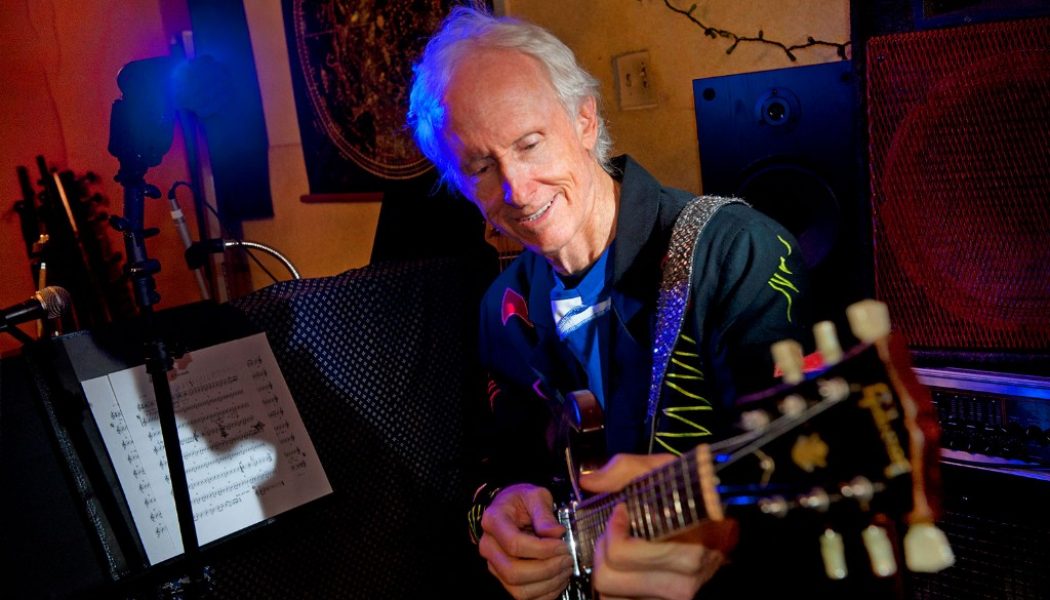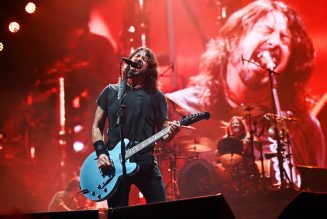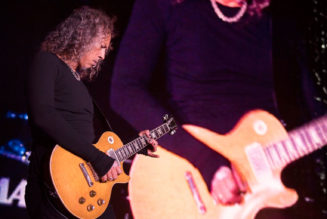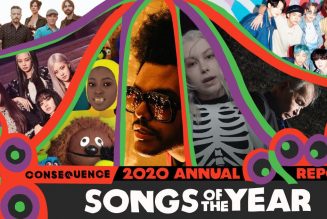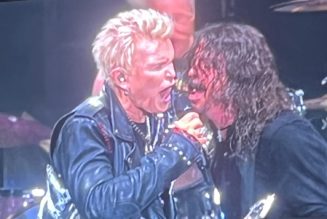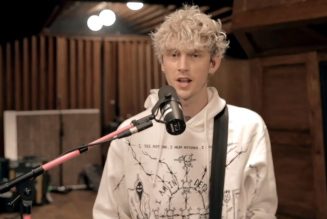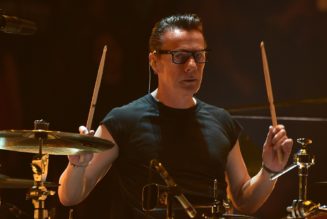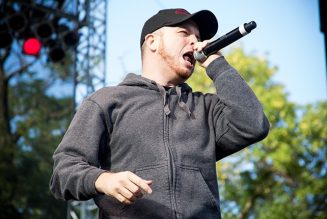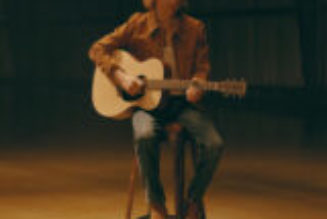
The album — the guitarist’s first in a decade — will arrive Aug. 14.
One of Neil Young’s best-known lyrics — “It’s better to burn out than to fade away” — can be applied to numerous casualties of ’60s rock n’ roll. Yet despite the turmoil he has experienced over his career, Doors guitarist Robby Krieger has neither burned out nor faded away.
Krieger wrote some of The Doors’ best songs, including “Light My Fire,” “Love Me Two Times,” “Touch Me” and “Love Her Madly.” And for the past 10 years, he has written jazz, blues and rock music from his home studio; guested on other people’s albums; formed the charity Art for a Cause to sell prints of his colorful paintings; and performed both Doors tunes and his solo material on tour.
Now, a decade since his last album, Singularity, the 74-year-old guitar hero is excited to release his seventh solo effort, The Ritual Begins at Sundown (The Players Club, Aug. 14). Its original April release date was pushed back due to the coronavirus pandemic.
“We’re using one of my paintings for the cover art, and when my manager looked at the painting, he came up with the name for the album right away,” reveals Krieger. “There’s a lot of similarities for me between music and painting when it comes to being creative. But there’s one big difference: Music is an immediate thing where you play what’s in your head in real time, whereas with painting you can take all the time you want.”
Like the Grammy Award-nominated Singularity, The Ritual Begins at Sundown is instrumental and was produced by ex-Frank Zappa bassist Arthur Barrow, who has produced all but one of Krieger’s solo albums. However, while the former project was rooted in ethereal blues-rock, the latter is more energized by the multitextured experimental jazz and progressive excursions of artists like Zappa.
“If you had to categorize it, I guess it’s a jazz album,” says Krieger. “The progressions are jazz, but there’s a little Zappa in there and a little Doors. Hopefully, it’s not just a straight jazz album. I think it’s more unique than that.”
One reason it’s so redolent of Zappa is Barrow recruited numerous Zappa alumni for the album, such as trombonist Jock Ellis, trumpeter Sal Marquez, keyboardist Tommy Mars and drummer Chad Wackerman. Other established jazzmen, including flutist AeB Byrne, saxophonists Vince Denim and Chuck Manning, and drummer Joel Taylor fleshed out the lineup.
Since almost all of the songs were collaborative efforts and the musicians had specific windows of availability, it took five years to finish the album. In addition to fairly conventional jazz numbers like “What Was That?” and “Bianca’s Dream,” The Ritual Begins at Sundown features jittery Zappa-inspired pieces with abrupt rhythm shifts and unconventional tempo changes. Krieger also covered “Chunga’s Revenge,” the title track from Zappa’s 1970 solo album.
“That was one that Zappa would play a lot when Arthur was in his band [from 1979 to 1984],” says Krieger. “Arthur used to help Frank sing it. When I was playing with these guys on the record, which was years ago, we used to do it and Arthur would sing it.”
Krieger first bumped into Zappa and his band The Mothers of Invention in the ’60s. At the time, he thought their music was “kind of corny.” But he liked the musicians in the group, and The Doors and The Mothers played numerous gigs together. (Zappa even offered to produce The Doors’ 1967 self-titled debut, but the band wound up hiring Paul Rothchild, known for his work with Love and Tim Buckley.)
Many years later, Krieger met Barrow through Zappa keyboardist Don Preston, who played on Krieger’s second solo album, Versions, in 1982. “I’ve been doing stuff with Arthur on and off for 20 years now,” says Krieger. “Musically, we get along good together. He loves The Doors. He always wants to write stuff that’s like The Doors, but I don’t. So we let a little Doors creep in once in a while.”
While The Ritual Begins at Sundown is a jazz album, “Yes, the River Knows” and “Slide Home” are slow, atmospheric tracks fueled by Krieger’s slide guitar, and “The Drift” and “Dr. Noir” feature elements of funk, with the latter heavily influenced by ’40s crime soundtracks. Originally, Krieger wanted to add vocals to “The Drift,” but it turned into an instrumental “because no one in the group is any good at singing,” he says.
A second version of the song featuring vocals by Macy Gray appeared in the Prince documentary Mr. Nelson: On the North Side. Krieger tracked the song with Gray at his studio, Horse Latitudes (named after a Doors song). “I wrote some lyrics about Prince, and she loved it,” he says. “I never met Prince, but he grew up in this thing called The Way, which was a boys’ club where all these cool musicians and young kids learned about music. When Prince passed away, The Way went by the wayside because they no longer had his support.”
Krieger understands how things can fall by the wayside. There have been numerous times during his career when he has felt low and gone for a month without picking up his guitar. For the past five years, however, hardly a day has passed when he hasn’t been rehearsing, writing, recording or playing. “I always want to keep improving as a guitar player, and the only way to do that is to play [different styles],” says Krieger. “I feel like a lot of guys do the same thing over and over. If I were to do that, it would be really boring.”
To remain inspired, he works with musicians he believes are more talented than he is. “I especially enjoy picking up stuff from how they play and applying it to my own music,” he says. “For me, that’s one of the best ways to learn.”
Krieger’s desire to keep evolving as a guitarist more than 55 years after he first picked up the instrument is exemplified by the artistry and enthusiasm he generates in The Ritual Begins at Sundown. That same wish to progress explains his embarrassment at being called a guitar hero.
“It’s amazing how many guitar players come up to me and say, ‘Hey, if it wasn’t for you, I never would have started playing guitar,’ ” he says. “I think it’s really because when I started in The Doors I had only been playing electric guitar for a year or so. I wasn’t good enough to copy anybody, so I had to make up my own stuff and it was pretty simple to play. I think that’s why people tend to learn my stuff when they start playing.”
Krieger credits his then-lack of experience for his psychedelic, freewheeling guitar style in The Doors; being in an improvisational band triggered him to be creative. “There was only one guitar and no bass player, so it made me play a certain way to fill those gaps in the music,” he says.
While jazz fans and Krieger followers will be excited about The Ritual Begins at Sundown, Doors devotees should be equally enthused that this year marks the 50th anniversary of the band’s comeback album Morrison Hotel. The record was released Feb. 9, 1970, about seven months after the ambitious but commercially disappointing The Soft Parade. Unlike much of the band’s simpler, more melodic work, the multifaceted, jazz-inflected tracks on that record were weighed down by horns, strings and spoken-word.
“The album just took forever to make and was more work than fun,” admits Krieger. “We were obsessing over every little thing, and we were taking five hours just to come up with a snare drum sound. And maybe by using the orchestra, people thought we were trying to copy The Beatles or something.”
Determined not to repeat the arduous nine-month-long studio experience of The Soft Parade, The Doors set out to create a bluesier, more spontaneous album that was more about riding out a groove than tapping into a cerebral songwriting style. The resulting Morrison Hotel, which took less than three months to record, yielded the classic-rock staples “Roadhouse Blues” and “Peace Frog.”
“We were just ready to have some fun, and I think that shows on the album,” says Krieger. “The sessions were very laid-back and loose. We had guys come in like John Sebastian on harp and Lonnie Mack playing bass, and we all had a good time.”
Morrison Hotel also paved the way for The Doors’ most successful album, 1971’s L.A. Woman, which featured the title track, “Love Her Madly” and “Riders on the Storm.” “L.A. Woman was the first time we produced ourselves,” says Krieger. “Paul Rothchild had done all our previous albums, but we had learned how to record and we knew what we wanted. Paul was off doing Janis Joplin, so it was kind of cool. We brought equipment in and did it at our own rehearsal place, and that was extremely fun. We worked on our own schedule and made our own hours. That was probably the most laid-back recording we ever did.”
Tragically, it was the last album The Doors would record with vocalist Jim Morrison. L.A. Woman arrived on April 19, 1971, and soon after, Morrison flew to Paris. He died in his apartment bathtub on July 3, 1971, at the age of 27.
“It was so sad,” recalls Krieger. “If that hadn’t happened, I think we could have gone on to make even better records in the vein of L.A. Woman. But we had a wild ride. I don’t regret any of it. And now I’m having fun working with Arthur Barrow and making new music. I’ve got no complaints.”
